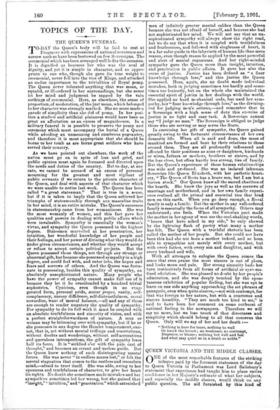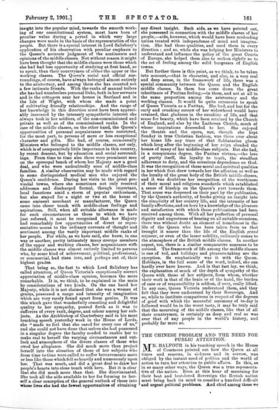QUEEN VICTORIA AND THE MIDDLE CLASSES.
ONE of the most remarkable features of the striking tributes paid by the foremost statesmen of the day to Queen Victoria in Parliament was Lord Salisbury's statement that experience had taught him to place entire confidence in her Majesty's estimate of what her subjects, and especially the middle classes, would think on any public question. The aid furnished by this kind of insight into the popular mind, towards the smooth work- ing of our constitutional system, must have been of peculiar value during a period in which very large changes were made in the basis of the representation of the people. But there is a special interest in Lord Salisbury's application of his observation with peculiar emphasis to the Queen's accurate judgment of the sentiments and opinions of the middle classes. Not without reason it might have been thought that the middle classes were those which she had had less opportunity of studying at first hand, so to speak, than their countrymen of either the upper or the working classes. The Queen's social and official sur- roundings, of course, have always belonged almost entirely to the aristocracy, and among them she has counted not a few intimate friends. With the ranks of manual toilers she has had numberless personal links, both in her servants and in the cottagers near her homes in Scotland and in the Isle of Wight, with whom she made a point of cultivating friendly relationships. And the range of her knowledge in this direction must have been appreci- ably increased by the intensely sympathetic interest she always took in her soldiers, of the non-commissioned and private as well as of the commissioned ranks. In the case of the middle classes, on the other hand, the Queen's opportunities of personal acquaintance were restricted, for the most part, to persons of more or less exceptional character and gifts. She had, of course, occasionally Ministers who belonged to the middle classes, not only, which is of comparatively little importance in this country, by recent descent, but by education and social surround- ings. From time to time also there were prominent men on the episcopal bench of whom her Majesty saw a good deal, and who were undoubtedly sons of middle-class families. A similar observation may be made with regard to some distinguished medical men who enjoyed the Queen's confidence. During her visits to the great pro- vincial towns, where she sometimes not only received addresses and discharged formal, though important, local functions amid a storm of popular enthusiasm, but also stayed for a night or two at the house of some eminent merchant or manufacturer, the Queen came into closer touch with middle-class feelings and aspirations. Still, when all suitable allowance is made for such circumstances as those to which we have just referred, it must be recognised that her Majesty had remarkably few opportunities of direct or repre- sentative access to the ordinary currents of thought and sentiment among the vastly important middle ranks of her people. For while, as we have said, she knew, in one way or another, pretty intimately many average members of the upper and working classes, her acquaintance with the middle classes was almost entirely limited to persons who, by some kind of achievement, political, professional, or commercial, had risen into, and perhaps out of, their highest grades.
That being so, the fact to which Lord Salisbury has called attention, of Queen Victoria's exceptionally correct appreciation of middle-class opinion, becomes the more remarkable. It is, we think, to be explained in the main by considerations of two kinds. On the one hand her Majesty, while it is not claimed that she was a woman of genius, possessed a range and intensity of imagination which are very rarely found apart from genius. It was this which gave that wonderfully consoling and delightful quality to her sympathy, poured forth as it was to sufferers of every rank, degree, and colour among her sub- jects. As the Archbishop of Canterbury said in his most touching speech yesterday week in the House of Lords, she " made us feel that she cared for every one of us," and she could not have done that unless she had possessed in a singular degree the faculty needed to enable her to make real to herself the varying circumstances and out- look and atmosphere of the divers classes of those who owed her allegiance. She did much more than project herself into the situation of those of her subjects who from time to time were called to suffer bereavements more or less like those which fell so heavily and numerously upon her. That was much, and did a great deal to draw her people's hearts into close touch with hers. But it is clear that she did much more than that. She discriminated. She took all the aids available to her for forming to her- self a clear conception of the general outlook of those into whose lives she had the fewest opportunities of obtaining any direct insight. Such aids, as we have pointed out, she possessed in connection with the middle classes of her people,—aids, however, which would have been misleading unless treated with independence of mind and imagina- tion. She had those qualities, and used them in every direction ; and so, while she was helping her Ministers to understand and influence the policy of the great Courts of Europe, she helped them also to reckon rightly as to the set of feeling among the solid burgesses of English towns.
But further there is this point, as we think, to be taken into account,—that in character, and also, in a very real and deep sense, in the framework of life, there was a special community between the Queen and the English middle classes. In them has come down the great inheritance of Puritan feeling,—in them, and not at all in the same proportion among the aristocracy and the working classes. It would be quite erroneous to speak of Queen Victoria as a Puritan. She had, and but for the early and crushing sorrow of her widowhood would have retained, that gladness in the sunshine of life, and that sense for beauty, which have been retained by the Church of England, and also by the Lutheran Church, much of whose inspirations descended to her. She enjoyed the theatre and the opera, nor, though she kept Sunday in true Christian fashion, was there ever about her home life any trace of that Sabbatarian gloom which long after the beginning of her reign clouded the homes of many of her middle-class subjects. But she had, in a conspicuous degree, the Puritan virtues,—the love of purity itself, the loyalty to truth, the steadfast adherence to duty, and the conscious dependence on God. It was the recognition of these moral and spiritual qualities in her which first drew towards her the affection as well as the loyalty of the great body of the British middle classes, and it was doubtless her recognition of the worthiness of their moral and religious standards which established a sense of kinship on the Queen's part towards them. That sense was deepened on their part by the publication, by the Queen's authority, of books giving an insight into the simplicity of her country life, and the intensity of her family affections, and on hers by a knowledge of the pleasure and satisfaction with which those publications had -been received among them. With all her perfection of personal dignity and augustness of bearing on all suitable occasions, there was without doubt an element of homeliness in the life of the Queen who has been taken from us that brought it nearer than the life of the English grand seigneur, or even of the lesser nobility, ordinarily comes to the atmosphere of the British middle classes. In another aspect, too, there is a similar comparative nearness to be noticed. The framework of life among the middle classes is one of toil, and holidays and pleasure-taking are the exception. So emphatically was it with the Queen. Holidays, in the full sense of the word, indeed, she can hardly ever have known. And in that fact lay, we think, the explanation of much of the depth of sympathy of the Queen with those of her subjects, from whom, whether their work is that of the brain or of the hand, the burden of care or of responsibility is seldom, if ever, really lifted. In any case, Queen Victoria understood them, and they felt that they were understood by their Sovereign. And so, while to institute comparisons in respect of the degrees of grief with which the mournful ceremony of to-day is followed would be in the worst taste, it may be truly said that the mourning of the middle classes, like that of all their countrymen, is certainly as deep and real as was ever that of any people in the world's history, and probably far more so.



































 Previous page
Previous page